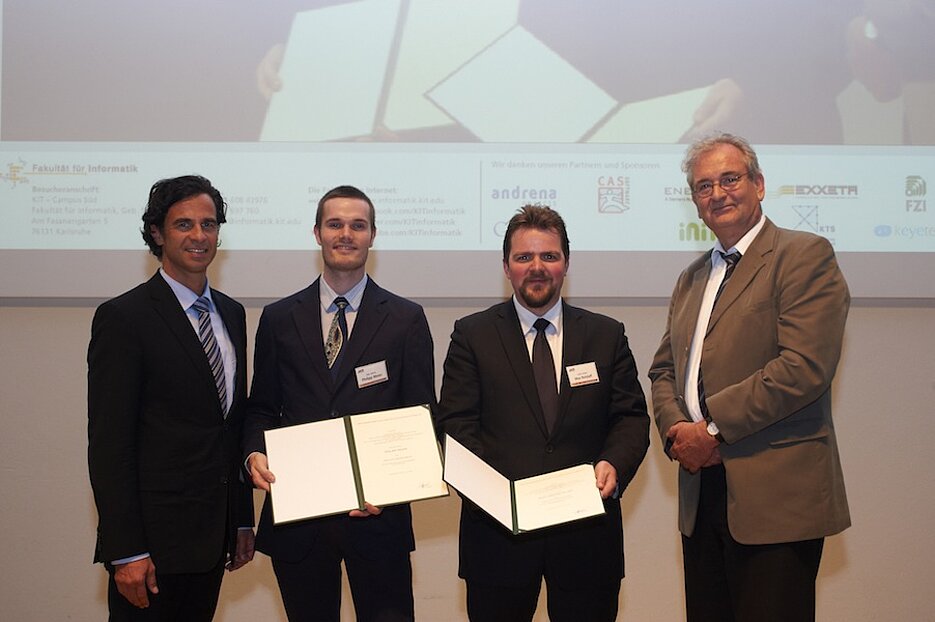FZI Prize "Best Diploma Thesis"
15.07.2011Philipp Meier from the Descartes Research Group wins the FZI Prize "Best Diploma Thesis"
Philipp Meier from the Descartes Research Group was awarded the FZI (Forschungszentrum Informatik) Prize "Best Diploma Thesis" for his diploma thesis with the title "Automated Transformation of Palladio Component Models to Queueing Petri Nets" supervised by Samuel Kounev and Heiko Koziolek. The work of the thesis was carried out in close cooperation with ABB Corporate Research.
The results of the thesis will appear in the following paper which will be presented at MASCOTS 2011 in Singapore:
Philipp Meier, Samuel Kounev, and Heiko Koziolek. Automated Transformation of Palladio Component Models to Queueing Petri Nets. In 19th IEEE/ACM International Symposium on Modeling, Analysis and Simulation of Computer and Telecommunication Systems (MASCOTS 2011), Singapore, July 25-27 2011. Acceptance Rate: 41/157 = 26%. [ bib ]
Thesis Abstract: In today's software engineering landscape, performance and scalability properties of systems are of crucial importance to ensure that quality-of-service requirements are satisfied. Changing systems in late development stages is very costly and therefore performance predictions early in the development process are essential to detect potential problems before resources have been spent on implementation. The Palladio Component Model (PCM) is a domain-specific modeling language for component-based systems enabling performance prediction at design time. Four performance-influencing factors are modeled for each system component: the component implementations, the external services they use, the execution environment on which they are deployed, and the component usage profiles. The modeled system is analyzed for selected performance metrics such as response time, throughput and resource utilization, by means of a PCM model solver. Several solvers exist which place different restrictions on the PCM model instance and offer different trade-offs between accuracy and overhead. However, existing solvers offer limited flexibility in terms of efficiency and accuracy of the solution process, and suffer from scalability issues. Queueing Petri Nets (QPNs) are another general-purpose modeling formalism, at a lower level of abstraction, that has been shown to lend itself very well for performance analysis of distributed component-based systems. Efficient and mature solution techniques are available for QPN models and therefore an automatic transformation from PCM to QPN models is highly desirable. It would open up the benefits of QPNs to the PCM community and provide a basis for future transformation to QPNs from other source models in the performance engineering domain. This thesis provides a bridge between the PCM and QPN formalisms making the following specific contributions: i) A formal mapping from PCM to QPNs analyzing the feasibility of using QPN models as a target analysis formalism for PCM models, ii) Implementation of an automatic transformation from PCM to QPNs in the form of a new PCM solver tool based on SimQPN, a mature simulator for QPNs, iii) An extensive evaluation of the PCM-to-QPN transformation in terms of results accuracy and analysis overhead, iv) A detailed comparison of the new SimQPN solver with existing PCM solvers, v) Formulation of future research directions, especially regarding the PCM stochastic expressions language and the possibilities to reduce expressions to more commonly-known probability distributions. The new SimQPN solver proved to be much faster than the existing SimuCom reference solver with performance improvements of up to 20 times. In most cases, the provided results were very accurate with a deviation from the reference values below 15%. The tool was integrated into the PCM-Bench tool, delivered with the PCM meta-model and compared with the SimuCom reference solver as well as with LQNS and LQSim, two existing solvers based on layered queueing networks. Customized PCM instances were created for each of the mapped features, evaluating for the first time in detail, the PCM features supported by each solver. Additionally, to evaluate the transformation in realistic conditions, five case studies were conducted using the largest existing PCM instances that could be obtained. One of the case studies was conducted in cooperation with ABB Research, demonstrating the applicability of the results of the thesis in an industrial context.



